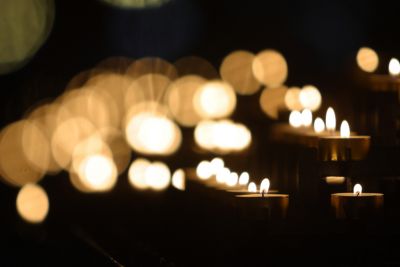 Just as individual people hold many different views about death, human civilizations also deal with the subject with a variety of philosophies, rituals and cultural norms. Many Western societies look upon the passing of a loved one as a somber event, mostly focusing on aspects of grief and loss. In Ghana, however, the living adopt a radically dissimilar approach to funerals, turning them into community events that give their departed loved ones a worthy send-off.
Just as individual people hold many different views about death, human civilizations also deal with the subject with a variety of philosophies, rituals and cultural norms. Many Western societies look upon the passing of a loved one as a somber event, mostly focusing on aspects of grief and loss. In Ghana, however, the living adopt a radically dissimilar approach to funerals, turning them into community events that give their departed loved ones a worthy send-off.
Large Funerals Are Common
Ghanaian funerals are opportunities to both mourn and celebrate deceased family and friends. In a 2014 CNN article, writer Paula Newton described these memorial services as social events that large numbers of mourners may attend. It’s not uncommon for a funeral to have hundreds of guests, and these huge crowds are positively perceived. As one mourner explained to Newton, it signifies that the individual was kind, respected and well-loved within the community.
If you know anything about West African funerary traditions, these views probably aren’t surprising. To the Grave and Beyond, a collection of pages residing on Saint Michael College’s servers, clarifies that the Yoruba, Ga, LoDagaa and Ashanti peoples place high importance on providing proper burials for loved ones. Their style and complexity usually depend on one’s social status and age at death.
Memorials Become a High Priority
Just as Ghanaian funerals are popular events, they’re also elaborate affairs that can require quite a bit of time and money to plan properly. In the previously mentioned CNN piece, one funeral planner told Newton that these memorials can cost between $15,000 and $20,000 each. Several elements explain the price tag, including:
- Huge colorful billboards announcing each funeral
- Entertainers and other hired professionals
- Food and drink
- Specially constructed coffins
Handcrafted Coffins With Colorful Designs
In contrast to the understated rectangular coffins of Western memorials, Ghanaian caskets are custom-tailored to represent every individual’s life and personality. Often, they’re crafted to resemble favorite objects of the deceased. Writer Charlotte Jansen profiled Paa Joe, an accomplished craftsman, for a 2016 piece in The Guardian. Joe is one of Ghana’s most prolific casket creators, having fashioned coffins in a huge range of designs that include Porsches, sneakers, cameras, chili peppers, lions, fish and much more. His work was featured in a major exhibit in Accra, the nation’s capital, that same year.
Celebrations Come With Important Protocols
Western mourners wouldn’t expect their fellow funeralgoers to dance, but it’s standard practice at Ghanaian funerals. BBC News published a video in 2017 that showed dancing pallbearers, with one explaining that he and his troupe tailor their services to the wishes of each departed loved one’s family. Other attendees can dance as well, and lively music is a typical part of these events. To be clear, most Ghanaian funerals start with prayer and church services. The partying occurs after the religious portion of the proceedings, which can be a bit more somber and observe a specific set of customs. OMGVoice writer Kwaku Darko mentions that only close relatives are permitted to sit in the front rows and the colors worn by guests depend on the age of the departed. Also, many Ghanaians frown on bringing children under age six, believing that babies are vulnerable to possession by spirits.
Ghanaian funerals share similarities with other West African memorial traditions that have found their way to the Americas through traditions such as the jazz funerals of New Orleans. They’re also proof that funerary customs can be shaped by religious beliefs as well as our hopes for our loved ones’ fates in the great beyond. In the end, how we mourn and celebrate our dead reflects who we are and what we value as people.
Add Your Comment